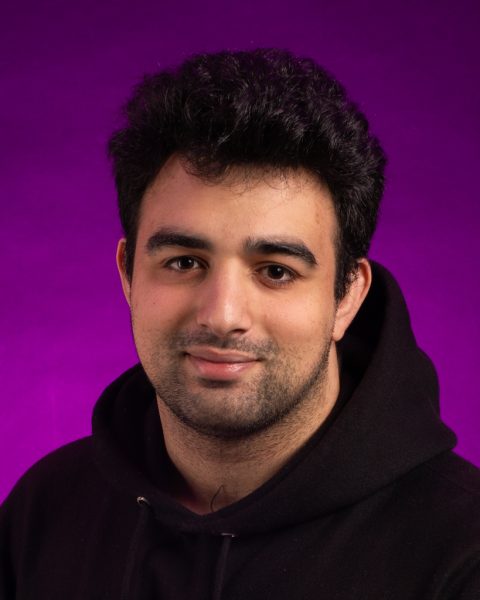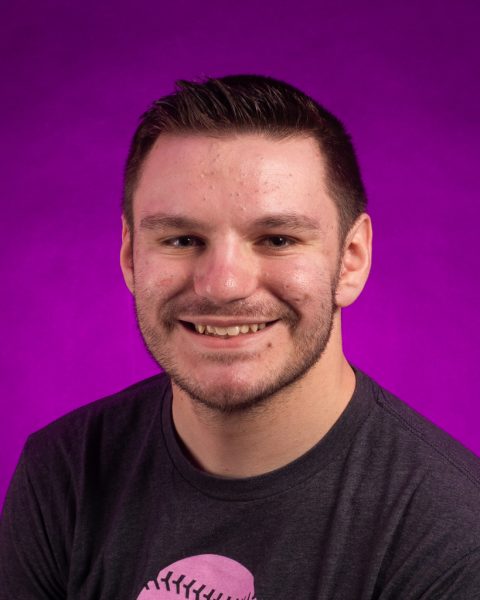



April 27, 2023
Welcome to the Chomp Pod, a podcast that brings city and statewide perspectives to SF State news.
Arman Archouniani, staff reporter, and Steven Rissotto, copy editor talk to mental performance coach Grant Parr, and Jim Afremow, Sports Psychologist, about mental health for professional and college athletes.
Arman: Hi my name is Arman Archouniani and I am a sports writer on the staff,
Steven: And I’m Steven Rissotto, a copy editor and sports writer on the staff. We will be your host on this episode of the Chomp Pod.
Arman: On this episode of the chomp pod we will discuss mental health for athletes
First I will be talking with the SF State Volleyball mental performance coach, Grant Parr, who earned his master’s in sports psychology from JFK University and has talked to many athletes such as Olympians, professional athletes, and college athletes. Parr has also worked with Virginia Commonwealth University and many different high schools in the Bay Area.
Arman; All right, so on this episode of the Trump pod, we are with Coach Grant Parr. He was the mental performance coach for the SF State volleyball team. Grant, I have a question for you. What made you so passionate about being a mental performance coach?
Grant: Yeah, it’s really interesting. It started back with an injury, I played football as a quarterback for 12 years and I had a career-ending injury my junior year at Sonoma State University and I waited two decades to deal with my two hip replacements on the same hip ao after my second surgery I started to like realize the things I was doing in my life wasn’t what I really wanted to do so I spent about a year and a half after my second surgery, really just discovering what I wanted to do next and I heard an ESPN interview about someone talking about a mental performance coach or sports psychologist, and I was like, what is that? And then I went home and I researched it and within two months of that moment, I actually was enrolled at JFK University, getting my master’s in sports psychology so the passion for it the motivation was because I wanted to get into this field to help athletes to get back on into their sport, or transition out of sport, they had a career-ending injury. That was the initial passion or motivation but after that, I realized there was so much more to help athletes with.
Arman: So yeah, you talked about your injuries at Sonoma State, you were D2 football player yourself, what kind of like helped build perspective on basically Was it because of your injuries that were you ever down on yourself because you just kind of felt alone?
Grant: Yeah, you know, it actually goes a little bit before that, because in junior college it’s actually when I did hurt my hip but I also shattered my my right ring finger, my throwing hand, so I was out half my freshman season so when you haven’t when you have an injury, and you’re away from the team, or you’re no longer you can’t play for the rest of the season it’s just you and your thoughts and so was I down on myself? I never gave up on myself but I was also I started to realize the difference between alone and loneliness. For me, being alone is okay. I like being alone but I was there moments where I felt very lonely. I didn’t feel involved, I felt out of place because of my injury and I would say that’s, that’s what I learned from having that injury. I was never gave up on myself, but I just definitely felt that loneliness.
Arman: And then talk me through about your time at SF State would basically, students just come in, or players be like, hey, what was the like consensus of what you guys would talk about? Was it more that they’re stressed about school and athletics was there like a common like theme that was going on?
Grant: Yeah, it was, it was a little bit of both. But I would say, typically, when I first started working with the volleyball team, it was usually it was in a team environment and I would always talk to coach Hoffman, usually the week before or a few days before to understand the dynamics because I wasn’t there every single day so just getting understanding, like where are the teams that where’s the weaknesses, where the strengths? Is there anything that I need? Like, is there a theme for this week that I that I can actually add to? So I would incorporate some of those themes and some of that information into my workshops so I was working with the team either every week or every other week. And then in between those team sessions, if athletes wanted to work with me one on one, they could I never forced anyone but I usually would have a handful of athletes that want to just ping me depending on what was coming up for them. And it was both it was it was playing time, it was school and it was either depending on the situation it was there. or injury?
Arman; Is there like a main goal between trying to get them up to their like peak level? What’s kind of your goal?
Grant: Well, it’s a few things. When I’m working with any athlete, no matter what we’re working on, the main thing is important to me being their coach is to have them have to trust me, that’s, that’s the number one thing that I do is, can I get them, hopefully in a short amount of time to trust me? If not, then that might take a little bit longer, because everyone’s different and some people, they look at mental performance coach, sometimes they go into that relationship or that experience going, I’m working with a mental performance coach so I have to spend time really building trust, and really meeting them where they’re at. And so, there’s so many things that depending on what the situation is, or what their goals are, and it’s always different for every athlete. So for me, just to answer that question is to build trust with them, but also for them, to learn how to be in control in the moment and trust themselves. Now, there’s a slew of other like things that come off that and there’s so many other strategies, but for them to literally do the good and the bad. Can they actually stay in control in the moment and trust themselves? And that’s what I teach.
Arman: I think one thing that’s kind of helped but also been kind of a negative thing to social media. I think people use it as like a platform in terms of like, they have a they have a platform in terms of just reaching out to many people that it might be dealing with the same thing. Would you think, would you say that social media has helped an impact on many people?
Grant: I think so I think with social media, there’s there’s good and there’s bad. I think the good part is there’s a lot of education. There’s a lot of inspirational, motivational, vulnerable content out there. And it’s very helpful. It’s awesome. I think where the social media can be negative is and it’s and this is interesting I’ve seen that more in the last decade, I’m dealing with more the whole idea of comparison, how that’s really, really actually paralyzing athletes, because there’s, they’re comparing themselves to others. And then they’re starting to be really hard on themselves comparing themselves to their older self, because of images that they’re seeing on social media. So that’s one downfall of social media but I think the upside of social media is that there’s a lot of awesome content out there that’s promoting this work.
Arman: Awesome. Thank you so much coach for getting on. It was really a pleasure talking to so thank you so much.
Grant: Yeah, you bet, man, this was great. Appreciate it.
Steven: Next we’ll be joined by Dr. Jim Afremow, a 20 year veteran of the sports psychology community, who is assisted numerous world-class athletes and teams ranging from the high school ranks, all the way to the college and pros, he served as a licensed professional counselor and a sports psychologist at Arizona State University from 2004 to 2013 and later, the peak performance coordinator and mental skills coach for the San Francisco Giants organization for three years. Additionally, he’s the author of four best-selling books.
Steven: All right, and we’re here with Dr. Jim Afremow and Dr. Jim, thanks for taking the time to come on the Chomp, how’re you doing today?
Jim: I’m doing great. Thanks so much, Steven.
Steven: Yeah, it’s definitely a pleasure and we have not covered the mental aspect of sports just yet so we’re excited to talk about that. The first thing I want to ask is, How did you get started in college athletics, because you’ve been doing it for a long time and I’m kind of wondering where the intrigue began.
Jim: You know, I’ve always been fascinated with sports, and also human psychology and so it’s the perfect combination for me, I just love thinking about, you know, I’m just a big sports fan and I love physical activity but I’m always curious about what makes people tick and, you know, how we get off course, how we could get back on course and then I’ve always been fascinated, fascinated by the great athletes, like what are they thinking in those big moments or, you know, how do they push them themselves through adversity when you know, they meet all those challenges, like slumps or injuries, and then just also the day to day grind, you know, how do you stay on top of it, even when you’ve accomplished big things, you know, how do you want more and, you know, stay after it so I’ve been very fortunate to work with Michigan State University when I was in grad school, and then Arizona State University for about 10 years and all the different sports and then I was the sports psychologist for the San Francisco Giants and just throughout the years, I’ve also worked with student athletes across you know, different sports, but also many different universities, including many in California.\
Steven: And one of the things that we often see at the college level and I know you can attest to this too. You’ve probably seen it a bunch is the balance between being a student-athlete, being a student and an athlete. It’s definitely one of the things that are the college athletes had to deal with the most, what kind of experience have you had, I guess, listening to students that have had trouble balancing it in the past and how that could be resolved.
Jim: Yeah, it’s really hard to strike that balance and it’s such a heavy physical load and it’s such a heavy mental load on the student-athletes and, you know, on top of that, they have so much going on in terms of just even, you know, a sport terms of practice, study hall, going to their classes, weights in the morning, and then also travel. So, you know, they might miss classes, those kinds of things but then life is still happening around them so you know, there’s still family problems, there’s still, you know, issues, maybe with relationships or friendships, a lot of student-athletes are, you know, from out of state or maybe even from a different country and so there’s homesickness involved. And then the level of competition is really tough so, you know, they’re most student-athletes at the college level are used to being the big duck on the little pond and now they’re, you know, kind of, a lot of them feel like the little duck on the big pond so their confidence could take a hit when they get to college so you have all those things going on at once. And, you know, it’s, it’s, it’s gotta be one of those things where, you know, you’ve got to find a way that you’re in charge instead of everything around you being in charge and that’s where the mental game comes in, you know, in terms of, you know, when all this adversity is strike, can you remain calm? Can you keep your focus? Can you stay confident? And then can you be all in in terms of your commitment level?
Steven: And a big thing because you’re an author of several books, and a big theme around a few of your books is the winning mentality? How does a college athlete gain the winning mentality? How do they learn how to win at a kind of such a young age?
Jim: Yeah, well, it’s a lot of it is starts with self awareness. What am I thinking? How am I feeling, you know, are my actions in line with my goals? You know, a great self reflection question, and also a motivator every morning is to ask yourself, you know, look in the mirror, look in your eyes, and ask yourself, you know, how do I want to show up today? Or what type of person do I want to be today? Or, you know, what am I going to bring to my team today? And so when you start asking yourself those right questions, it’s very clear, you know, am I in line with that, am I getting off track, but then also, it’s a motivator in terms of, hey, let’s be the teammate I want to play with, you know, or let’s be the athlete that I would want to coach and so not taking every day for granted, but really looking at it as an opportunity to be your best self and, you know, to really appreciate that because student athletes sometimes forget that there are a lot of other students, you know, students that wish they were playing, you know, sports at the college level, but maybe just weren’t good enough so really have an attitude of gratitude about where you’re at and then, you know, as running legend, American, you know, long distance running legend, Steve Prefontaine said, to give anything less than your best is to sacrifice the gift and unfortunately, because of, you know, all the challenges that we talked about, a lot of student athletes sometimes sacrifice the gift, you know, they kind of give up on their hopes and dreams. You know, this is too hard, maybe I’m not as good as I thought I was and that’s, again, where the mental game comes in, where you got to block and replace those thoughts. You got to say, no, that’s not true. You know, there’s still plenty of opportunity, let’s see what’s possible and get really excited about that. And always strive to be the gold medal version of yourself.
Steven: And I guess one thing that maybe you have to deal with a little bit, is that there’s a stigma around the mental side and dealing with the mental side and dealing I guess, with sports psychologists like yourself, some people may consider it for the quote on quote, mentally weak, only the mentally weak go to sports psychologists, we’ve heard that for so many years. How does that narrative change or I guess, is that changing currently?
Jim: It’s definitely changing. You know, before if you met with a sports psychologist, or a mental coach, or even a counselor was like, Well, what’s wrong with you? And, you know, now, it’s almost like, well, what’s wrong with you if you’re not doing that, because why not try to get every competitive advantage you can get? People are more open-minded about it and most of the athletes that I work with, whether at the pro level, college level, high school level, after a few sessions, you know, if this is the first experience with it, they’re like, Hey, this isn’t so bad I wish I started this a long time ago. And it’s fun to again there, you don’t have to be sick to get help, you don’t there doesn’t have to be a problem to get better and so what I’m finding more and more is a lot of student-athletes are coming to me and saying, Hey, things are actually going pretty well but I want to see what’s possible in my own game in life so how can you help me with that? You know, no one ever says you know, I have too much confidence so I’m too focused, you know, I keep my calm to well, you know, all those things we can improve upon.
Steven: Dr. Jim, I really appreciate you spending a few minutes here on the Chomp Podcast. It was a blast and thank you for coming on the show.
Jim: You bet. Steven, thanks so much and thanks for all the great work you’re doing.
Arman: That will conclude this episode of the Chomp Pod, we will be back soon and make sure to follow us on Twitter @TheChompPod and Golden Gate Xpress @GGXNews.

